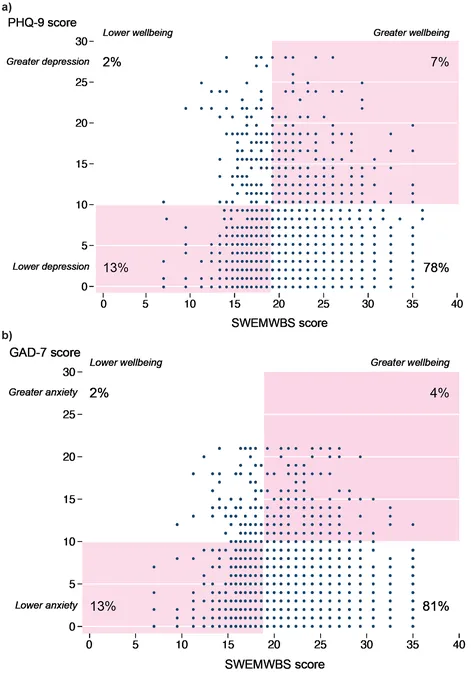
Unveiling the Hidden Battles: Mental Health and Wellbeing of Women in India’s Urban Slums
2024-10-09
Author: Sarah
In a world where mental health struggles are often shrouded in silence, the statistics are staggering. Approximately 420 million individuals grapple with mental health issues globally, translating into a staggering economic burden of $5 trillion. Prior to the COVID-19 pandemic, nearly 970 million people were living with a mental disorder, with a significant emphasis on women, representing over 50% of this population. As disturbing as this data is, the focus often remains squarely on mental illness alone, neglecting a comprehensive understanding of mental health, which encompasses both wellbeing and distress.
The World Health Organization (WHO) describes mental health as “a state of well-being that empowers individuals to handle life’s stresses, realize their potential, and contribute positively to society.” This reflects a broader interpretation of health that sees it as more than just the absence of disease, echoing ideas articulated long before the modern era.
Interestingly, the conversation around mental health is evolving to recognize two axes: mental wellbeing and mental illness. According to Keyes’ two continua model, wellbeing and mental illness coexist, creating a complex landscape of mental health. Mental wellbeing is characterized by optimal functioning, fulfilling relationships, and a sense of purpose—a stark contrast to mental distress and illness, where individuals struggle against emotional pain and psychological burdens.
A significant concern arises from the shocking prevalence of mental disorders in India, where estimates suggest that anywhere from 2% to 61% of people living in urban informal settlements are affected. Despite advances in physical healthcare, the mental health sector in India endures significant challenges including inadequate resources, social stigma, and low public awareness. Currently, only a meager 0.16% of the national healthcare budget is allocated to mental health services. The Mental Healthcare Act of 2017 was a landmark step in acknowledging mental health rights, yet the emphasis on wellbeing remains markedly absent.
Highlighting the Plight of Women
SNEHA (Society for Nutrition, Education, and Health Action), an NGO in Mumbai, has dedicated itself to addressing violence against women in these informal settlements for over two decades. This group focuses on the unique mental health challenges faced by women in socioeconomically disadvantaged environments, which differs substantially from the experiences of those in more affluent settings.
The organization recognizes that factors such as income, education, and accessibility to health services play a crucial role in influencing mental health outcomes. Their study surveyed nearly 5,000 women aged 18-49, revealing profound insights into mental health and wellbeing; 15% reported low wellbeing, while 9% and 6% exhibited symptoms of moderate-to-severe depression and anxiety, respectively. Notably, symptoms of anxiety, depression, and low wellbeing were more pronounced among older, poorer, and less educated women.
Findings indicated that nearly one in four women surveyed reported either low wellbeing or symptoms of severe anxiety or depression. The correlation between these factors suggests the urgent need for integrated mental health services tailored to the unique realities of urban slums.
Understanding and Intervening
Through structured interviews and targeted assessments, researchers collected data that underlined the importance of community support and resource availability in mitigating mental health struggles. The results highlight a need for a nuanced approach—mental health interventions must incorporate both the psychological and socio-cultural determinants affecting women’s lives.
Importantly, the study reveals a complex relationship between wellbeing and symptoms of mental illness. Women with low wellbeing did not always report anxiety or depression, and vice versa. This nuance raises important questions: Can women thrive despite the weight of mental illness? What support systems allow for resilience and high levels of wellbeing among vulnerable populations?
While challenges around methodology and reporting persist, the overall findings bring attention to the essential interplay between mental illness and wellbeing in urban informal settlements. Future research should consider the protective factors that enable women to maintain a sense of wellbeing amidst adversity.
Ultimately, it is crucial to recognize that mental health must be approached as a multidimensional issue, where both mental wellbeing and common mental disorders coexist. This holistic understanding can pave the way for effective interventions and policies that address the realities of women living in India's urban slums and beyond, reaffirming their right to mental health alongside their physical wellbeing.

 Brasil (PT)
Brasil (PT)
 Canada (EN)
Canada (EN)
 Chile (ES)
Chile (ES)
 España (ES)
España (ES)
 France (FR)
France (FR)
 Hong Kong (EN)
Hong Kong (EN)
 Italia (IT)
Italia (IT)
 日本 (JA)
日本 (JA)
 Magyarország (HU)
Magyarország (HU)
 Norge (NO)
Norge (NO)
 Polska (PL)
Polska (PL)
 Schweiz (DE)
Schweiz (DE)
 Singapore (EN)
Singapore (EN)
 Sverige (SV)
Sverige (SV)
 Suomi (FI)
Suomi (FI)
 Türkiye (TR)
Türkiye (TR)